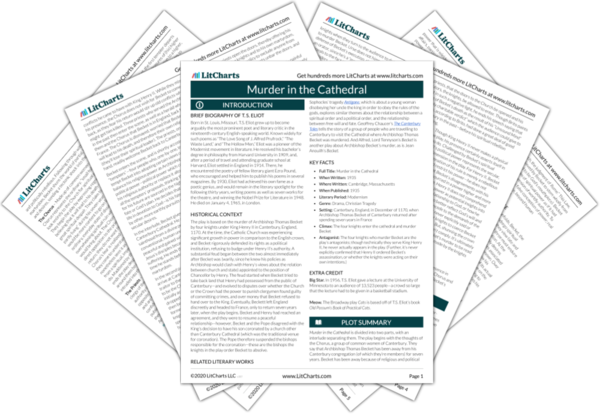Murder in the Cathedral is divided into two parts, with an interlude separating them. The play begins with the thoughts of the Chorus, a group of common women of Canterbury. They say that Archbishop Thomas Becket has been away from his Canterbury congregation (of which they’re members) for seven years. Becket has been away because of religious and political conflicts he came to have with King Henry II. While they miss his presence, the Chorus does not wish for Becket to come back, as they fear his return would stir up old conflicts which might get him killed. Three priests who served the Archbishop in the past then enter the scene, as well as a herald who informs them and the Chorus that Becket is in England, back from France. The Chorus is dismayed, worried that Becket’s return will lead to his death, and therefore their own religious turmoil (they’ll lose their spiritual leader). The priests, on the other hand, readily welcome Becket back to Canterbury.
Becket enters the scene, and is shortly accosted by four “tempters”—four people who, one-by-one, try to persuade or tempt Becket into adopting certain views on how he should balance his religious power as Archbishop with its associated political power—political power which could either supplement his religious authority or replace it altogether. Becket discounts all the tempters’ proposals, thinking that none of their visions for his future are sourced in the higher, spiritual dimension of fate or God’s plan. He decides that martyrdom—sacrificing his life in devotion to God—is his fate, and refuses to be tempted by other, more earthly pursuits of political power or worldly, secular desires.

In the interlude, Becket gives a sermon to the congregation of Canterbury Cathedral. He asks his audience to think about sainthood from a divine perspective and reconsider the conventional, human understanding of saintliness as pure, peaceful and gained without torturous hardship, adding that Jesus’s disciples became saints only after experiencing great suffering. He ends the sermon by saying that it may be the last time he stands before the congregation, foreshadowing his martyrdom.
In the second part of the play, four knights serving Henry II arrive at Canterbury Cathedral and accost Becket, calling him a traitor to the crown. Before Becket left, the king appointed him to be the Chancellor of England as well as Archbishop. After initially accepting both positions, however, Becket immediately dropped the chancellorship. Further, the knights say Becket then began to abandon all the king’s policies which he had formerly supported. Claiming they’ve been sent by the king, the knights ask Becket if he’ll agree to appear before Henry II and speak for his actions. Becket responds by saying that, if the king has ordered such an appearance, then the public ought to be allowed to know Henry II’s charges against him and personally witness his defense against them. The knights disregard this response and move to attack Becket, but the priests and some attendants enter the scene before they get a chance to. The knights leave, promising to return for Becket.
Knowing that the knights will be returning to murder the Archbishop, the priests try to persuade him to go into hiding, but Becket refuses, fully committed to his martyrdom. When the knights come back to the cathedral, the priests bar its front doors, preventing them from entering. Becket, however, demands that the priests open the doors, thereby offering his life up to the swords of the knights and to his own martyrdom, saying it’s against the Church’s policy to exclude anyone from entering one of its cathedrals. The priests unbar the doors, and the knights enter and kill Becket.
Devastated by Becket’s death, the Chorus cries out in painful desperation that the sky and air be cleansed of the death newly sprung upon Canterbury. The priests, however, conclude that Becket’s death was a manifestation of fate, and that the Church is stronger for it. The four knights then turn towards the audience and offer arguments in defense of their decision to murder Becket. They describe why they think he was a traitor to the king and also largely responsible for his own death. The play ends with the Chorus asking God to forgive them and have mercy on them for not seeing—at first—Becket’s martyrdom as having incredible spiritual significance beyond their own personal concerns. Following the priests, the Chorus evolves to see Becket’s death as something caused by a divine source which they cannot understand but which nonetheless merits their faith and devotion.







